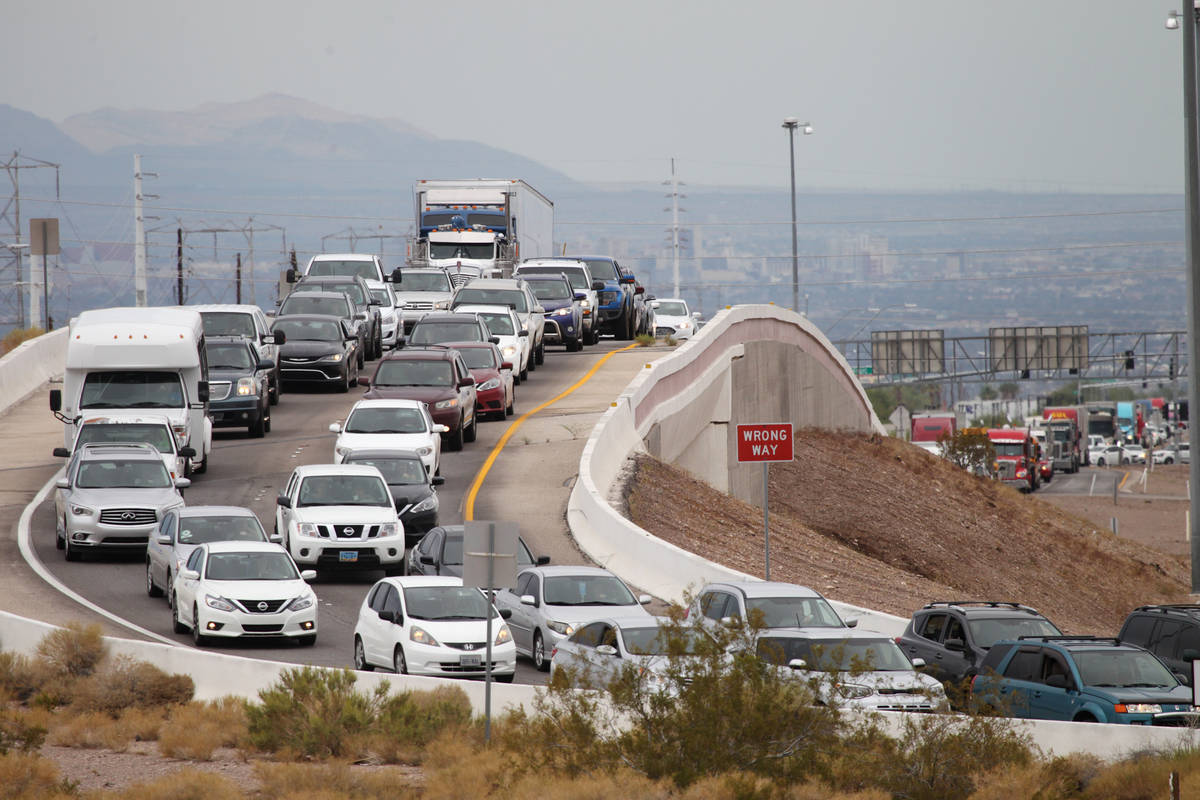Nevada adopting stricter car pollution standards
CARSON CITY — Gov. Steve Sisolak announced that Nevada will move to adopt California’s auto-pollution standards, a move that comes as state officials have pushed back against the Trump administration’s decision to relax federal vehicle emission standards in recent months.
The state’s Division of Environmental Protection is proposing a new set of regulations for Nevada that would incorporate two parts of California’s benchmarks that would set new tailpipe emission standards for light and medium-duty vehicles sold in the state starting in 2024 and also require dealerships to sell a certain percentage of zero-emission vehicles.
State environmental officials said that the regulations, if adopted, are part of the state’s larger climate policy goals and would reduce air pollution while also increasing air quality, especially in the state’s large metropolitan hubs of Las Vegas and Reno, where ozone pollution has become increasingly problematic.
“This is one step among multiple actions that we expect to be taking to achieve our greenhouse gas emission reduction goals,” said Kristen Averyt, Nevada’s state climate policy coordinator. “We have to have an aggressive plan to meet those goals.”
Special state standards
The 1970 Clean Air Act gives the federal Environmental Protection Agency the authority to regulate emission standards for motor vehicles sold in the U.S. But the law has an exception for California to adopt its own regulations with the approval of the EPA. Other states can then adopt those standards as long as they are identical to California’s, and do not need the EPA’s approval to do so.
Fourteen other jurisdictions have adopted the stricter California regulations: Colorado, Connecticut, Delaware, Maine, Maryland, Massachusetts, New Jersey, New York, Oregon, Pennsylvania, Rhode Island, Vermont, Washington state and Washington, D.C. Two other states, New Mexico and Minnesota, have announced their intentions to adopt the regulations, as well.
Pam Kiely, senior director of regulatory strategy for the environmental advocacy group Environmental Defense Fund, called the move “an important first step toward more clean transportation options for Nevada.”
“Nevada’s transportation sector is the largest source of greenhouse gas emissions in the state and a major contributor to harmful air pollution — stepping up action in this sector is essential,” Kiely said in a statement.
About 35 percent of the state’s greenhouse gas emissions are from the transportation sector, said Greg Lovato, administrator of the state’s environmental protection division, with more than half of those emissions coming from passenger cars and trucks. Only 1 percent to 2 percent of vehicles sold in Nevada are zero-emission, Lovato added.
Lovato said the regulations would be an “aggressive increase” in the number of zero-emission vehicles sold, but said that number will be finalized during the regulation-adoption process, which is likely to take more than a year.
Rollback after Obama
Nevada’s announcement comes about three months after the EPA and National Highway and Safety Administration announced the final rule that rolled back vehicle-emissions standards set by the Obama administration. The new rule reduces fuel efficiency standards to an annual 1.5 percent miles-per-gallon increase for model years 2021 through 2026. Standards issued under the Obama administration required about 5 percent annual increases to fuel efficiency.
In September, the Trump administration revoked California’s authority to set its own standards. Nevada and nearly two dozen other states sued the Trump administration over the rule change, saying it would hinder the nation’s economy and stymie strides made in combating climate change.
The move to adopt California’s stricter standards wasn’t a direct reaction to the tailpipe emission rule change, said Lovato. But he noted that the two were certainly related.
“The steps that the Trump administration has taken to both revoke the California waiver and to change the emission standard target, those are steps that aren’t compatible with Nevada,” Lovato said. “If we’re going to stay on the path to meet our greenhouse emission standards, we’re going to have a tough time if we don’t take this action.”
Contact Capital Bureau Chief Colton Lochhead at clochhead@reviewjournal.com. Follow @ColtonLochhead on Twitter.


















